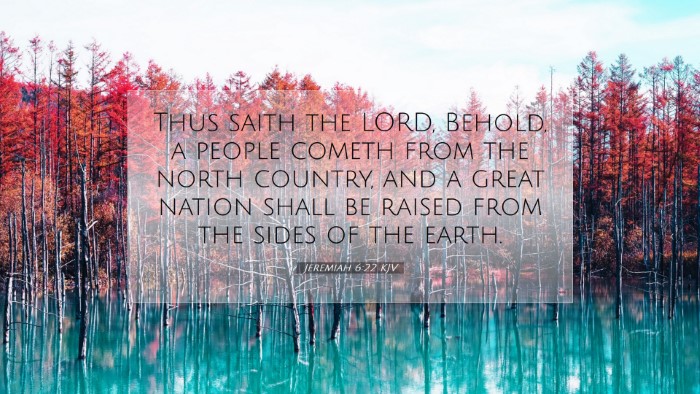Commentary on Jeremiah 6:22
Jeremiah 6:22 states:
“Thus saith the Lord, Behold, a people cometh from the north country, and a great nation shall be raised from the sides of the earth.”
Introduction
The Book of Jeremiah is filled with prophetic messages that emphasize the impending judgment against Judah due to their persistent idolatry and moral decay. In this particular verse, the prophetic imagery points to the rise of a formidable nation from the north, a forewarning of the Babylonian invasion.
Analysis of Jeremiah 6:22
This verse can be dissected into several important components:
- The Divine Pronouncement: "Thus saith the Lord" establishes the authority of the message.
- The Incoming Threat: The reference to a "people cometh from the north country" indicates the impending judgment through external forces.
- A Great Nation: The term "great nation" highlights the power and the strategy of the invaders who will execute God's judgment.
Historical Context
Historically, the northern powers, particularly the Babylonians under Nebuchadnezzar, posed a significant threat to Judah. Understanding this context is crucial for interpreting the text accurately. With the political alliances collapsing and the moral fabric of the society disintegrating, the prophecy of judgment is not merely a foretelling of physical invasion but also a spiritual diagnosis of the nation's condition.
Commentary Insights
Drawing from prominent public domain commentaries, we explore insights from Matthew Henry, Albert Barnes, and Adam Clarke regarding Jeremiah 6:22:
Matthew Henry’s Commentary
Matthew Henry emphasizes the divine sovereignty in the actions of nations, asserting that even enemies fulfill God's purposes. He notes that the north represents both geographical and moral decline, with the impending invasion serving as a manifestation of God’s displeasure with His people. Henry remarks that God's declarations are a warning to sinners — a chance for repentance before judgment descends.
Albert Barnes’ Notes
Albert Barnes provides a detailed exploration of the geographical implications of the "north country." He stresses that in biblical tradition, the north symbolizes danger and judgment, often associated with the enemies of Israel. Barnes articulates that this verse underscores the inevitability of divine retribution entwined with the historical narratives of the Babylonian captivity. His commentary aligns with a theological understanding that even in judgment, God’s purpose is redemptive, calling His people back to Himself.
Adam Clarke’s Commentary
Adam Clarke discusses the broader implications of the coming nation, interpreting it not just as an immediate threat but as part of God’s long-standing covenant relationship with Israel. He notes that the prophecy illustrates a pattern seen throughout scripture where divine mercy and judgment coalesce. Clarke highlights that the promise of restoration following judgment underscores God’s nature as both just and merciful, encouraging believers to heed warnings rather than dismiss them as archaic.
Theological Implications
The verse carries profound theological implications that resonate deeply with pastors and scholars today:
- God’s Sovereignty: The proactive declaration “Thus saith the Lord” reinforces that God is not passive or uninvolved in human history. He is sovereign over nations.
- Judgment and hope: The impending invasion signifies both judgment on sin and a call for repentance, revealing God’s desire for restoration.
- Lesson for the church: Contemporary readers must consider how modern societal issues mirror those of ancient Israel, prompting a reflective examination of spiritual fidelity.
Conclusion
Jeremiah 6:22 serves as a critical junction in understanding God’s message to His people about the consequences of their actions. With rich commentary from various theological scholars, this verse provides significant insights into God's nature, the complexity of divine judgment, and the ever-present potential for redemption. As pastors, theologians, and students grapple with the implications of this verse, it invites each to seek a deeper relationship with the God who speaks through history to His people.


